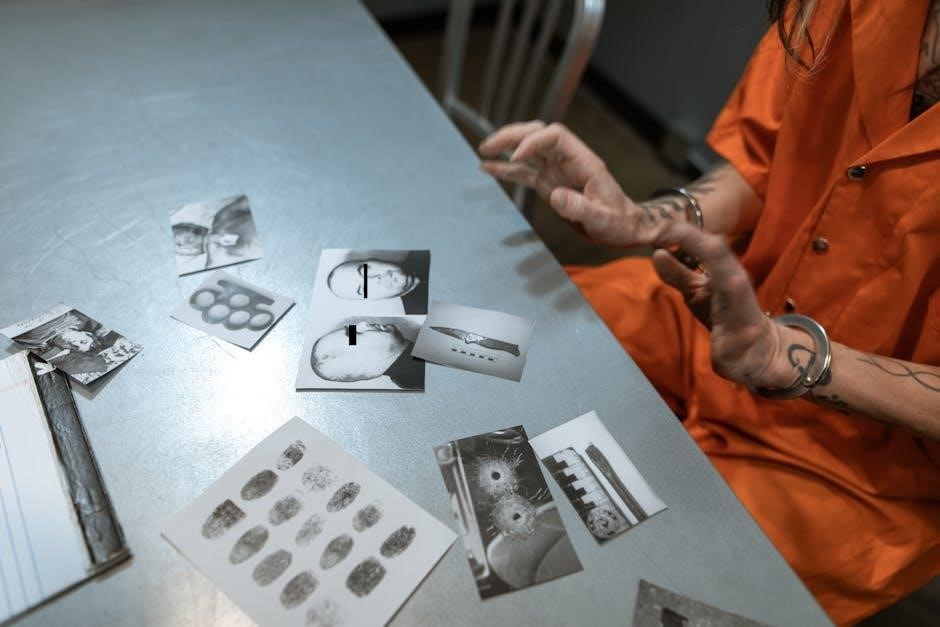creed of the noncommissioned officer pdf

The Creed of the Noncommissioned Officer‚ established in 1973‚ embodies the ethical and professional standards guiding NCOs․ It serves as a cornerstone of military professionalism‚ outlining leadership principles and the unwavering commitment to soldiers and mission․
Overview of the NCO Creed
The NCO Creed‚ written in 1973‚ is a foundational document that outlines the professional and ethical standards for Noncommissioned Officers in the U․S․ Army․ It emphasizes the NCO’s role as a leader‚ mentor‚ and guardian of Army traditions․ The Creed highlights the NCO’s commitment to professionalism‚ accountability‚ and selfless service․ It underscores the importance of placing soldiers’ needs above one’s own and upholding the highest standards of integrity and ethical conduct․ The Creed serves as a guide for NCOs to inspire and motivate soldiers‚ fostering a culture of excellence and discipline․ It is a living document that reflects the enduring values of the NCO Corps and its vital role in the Army’s mission․
Historical Context and Significance
The NCO Creed‚ written in 1973‚ was created to reaffirm the role of Noncommissioned Officers as the backbone of the Army․ It emerged during a period of significant transformation in the military‚ aiming to inspire NCOs to embrace their leadership responsibilities fully․ The Creed was developed to address the evolving challenges of military leadership and to unify the NCO Corps under a shared set of principles․ Its creation marked a pivotal moment in the professional development of NCOs‚ emphasizing their critical role in leading soldiers and upholding Army traditions․ The Creed remains a cornerstone of NCO professional identity‚ reflecting the enduring values of leadership‚ duty‚ and service․
The Role of Noncommissioned Officers in the Army
Noncommissioned Officers are the backbone of the Army‚ leading soldiers‚ mentoring teams‚ and ensuring mission success․ Their leadership and expertise are vital to daily operations and unit effectiveness;

Leadership and Mentorship Responsibilities

Noncommissioned Officers are role models who lead by example‚ fostering discipline‚ accountability‚ and unity within their units․ They prioritize mentorship‚ guiding soldiers to achieve their full potential by sharing knowledge and experience․ NCOs are responsible for training‚ advising‚ and inspiring their teams‚ ensuring mission readiness and success․ Their leadership extends beyond task execution‚ focusing on personal and professional development to build resilient and capable soldiers․ By fostering a positive and inclusive environment‚ NCOs strengthen unit cohesion and morale‚ embodying the Army’s values and the NCO Creed’s principles․ Their proactive approach ensures continuous growth and operational excellence‚ making them indispensable to the Army’s mission․
The NCO as the Backbone of the Army
Noncommissioned Officers are the backbone of the Army‚ entrusted with leading‚ training‚ and motivating soldiers to achieve excellence․ They are the primary enforcers of standards‚ ensuring discipline and readiness at all levels․ The NCO Corps serves as the bridge between senior leadership and enlisted personnel‚ translating policies into actionable guidance․ Their expertise and experience are vital in maintaining unit cohesion and operational effectiveness․ NCOs embody the Army’s values‚ fostering a culture of professionalism‚ accountability‚ and teamwork․ As mentors and leaders‚ they play a pivotal role in shaping the future of the Army‚ ensuring the organization remains strong and capable of overcoming any challenge․

Key Principles of the NCO Creed
The NCO Creed emphasizes professionalism‚ accountability‚ and unwavering commitment to soldiers and mission․ It underscores leadership‚ mentorship‚ and upholding the highest standards of integrity and excellence always․
Professionalism and Accountability
Professionalism and accountability are central tenets of the NCO Creed‚ emphasizing the Noncommissioned Officer’s commitment to uphold the highest standards of ethics and performance․ Accountability extends to both personal actions and the guidance of subordinates‚ fostering a culture of trust and reliability․ NCOs are expected to lead by example‚ demonstrating unwavering dedication to their duties and the Army’s values․ This principle ensures that leaders maintain integrity‚ take responsibility for their actions‚ and promote a disciplined environment․ By embodying professionalism and accountability‚ NCOs set the foundation for effective leadership and mission success‚ reflecting the Creed’s enduring legacy in military excellence․
Commitment to Soldiers and Mission
The Creed underscores the NCO’s unwavering commitment to soldiers and mission‚ prioritizing their needs above personal interests․ This dedication ensures soldiers are trained‚ mentored‚ and prepared to excel in their roles․ NCOs strive to foster a supportive environment‚ addressing challenges and fostering growth․ Clear communication and empathy are vital‚ enabling leaders to understand and meet their teams’ requirements․ By placing mission success and soldier well-being at the forefront‚ NCOs embody the Army’s values and uphold the Creed’s principles․ This commitment is the foundation of effective leadership‚ ensuring unity and purpose within the unit‚ and reflects the Creed’s enduring relevance in modern military contexts․
Practical Application of the Creed
The Creed’s principles are applied daily through leadership‚ mentorship‚ and accountability․ NCOs implement these values in training‚ decision-making‚ and fostering unit cohesion‚ ensuring mission success․
Daily Leadership Practices
Daily leadership practices of NCOs involve leading by example‚ fostering a culture of accountability‚ and prioritizing soldier well-being․ Reciting the Creed regularly reinforces core values‚ while mentoring juniors ensures professional growth․ NCOs use checklists to maintain standards and apply the Warrior Ethos in decision-making․ By embodying professionalism and integrity‚ they inspire loyalty and commitment‚ fostering unit cohesion and mission readiness․ These practices translate the Creed’s principles into actionable steps‚ ensuring its ideals are lived every day․ Through consistent and ethical leadership‚ NCOs uphold their role as the Army’s backbone‚ driving success in all endeavors․
Living the Creed in Modern Military Context
Living the Creed in today’s military demands adapting its timeless principles to contemporary challenges․ NCOs balance traditional leadership values with modern complexities‚ such as technological advancements and diverse team dynamics․ They embrace continuous learning‚ fostering innovation while maintaining discipline․ The Creed’s emphasis on professionalism and accountability resonates in modern operations‚ where ethical decision-making is crucial․ By integrating the Creed’s teachings‚ NCOs inspire resilience‚ adaptability‚ and unity‚ ensuring mission success in dynamic environments․ They lead with empathy and inclusivity‚ fostering trust and collaboration․ The Creed remains a guiding force‚ enabling NCOs to navigate the evolving military landscape while upholding the Army’s core values․

The Importance of Memorization and Understanding
Memorizing the Creed reinforces its principles‚ while understanding ensures its practical application‚ making it integral to an NCO’s identity and leadership effectiveness․
Techniques for Memorizing the Creed
Effective memorization of the NCO Creed involves repetition and practical strategies․ Writing it down by hand reinforces memory‚ while reading it daily helps build familiarity․ Breaking the creed into sections allows focused learning‚ and reciting it aloud enhances retention․ Utilizing audio resources‚ such as videos or recordings‚ aids in mastering the rhythm and pacing․ Regular practice‚ even in short sessions‚ ensures long-term retention․ These techniques not only help in memorization but also deepen understanding‚ enabling NCOs to embody the creed’s principles in their leadership roles․
Reflection and Personal Growth
Reflecting on the NCO Creed fosters personal growth by encouraging self-assessment and alignment with its principles․ Soldiers can evaluate their actions and decisions against the creed‚ identifying areas for improvement․ This introspection promotes accountability‚ professionalism‚ and a deeper understanding of leadership responsibilities․ Regular reflection also enhances moral character and strengthens commitment to the mission and fellow soldiers․ By internalizing the creed‚ NCOs develop a strong ethical foundation‚ essential for effective leadership and fostering a positive military culture․ This process of reflection and growth ensures the creed remains a living guide‚ shaping both individual and collective excellence within the Corps․
The NCO Creed remains a timeless foundation for military leadership‚ inspiring Noncommissioned Officers to embody professionalism‚ integrity‚ and unwavering dedication to their soldiers and mission․

The Enduring Legacy of the NCO Creed
The NCO Creed‚ established in 1973‚ continues to resonate as a powerful symbol of leadership and professionalism within the Army․ Its timeless principles have guided generations of Noncommissioned Officers‚ shaping their roles as mentors‚ leaders‚ and the backbone of the military․ The Creed’s emphasis on accountability‚ integrity‚ and selfless service has cemented its legacy as a cornerstone of military ethos․ By inspiring NCOs to lead by example and uphold the highest standards‚ the Creed ensures the Army’s continued strength and readiness․ Its enduring relevance underscores its importance in fostering a culture of excellence and dedication‚ making it a foundational document for NCOs to aspire to and live by․
Its Impact on Military Leadership

The NCO Creed has profoundly shaped military leadership by instilling a culture of professionalism‚ accountability‚ and selfless service․ It serves as a guiding principle‚ inspiring NCOs to lead by example and prioritize their soldiers’ needs above their own․ The Creed’s emphasis on mentorship and leadership development has fostered a legacy of competent and compassionate leaders․ By adhering to its principles‚ NCOs have become the backbone of the Army‚ ensuring unit cohesion and mission success․ Its influence extends beyond individual leadership‚ contributing to the overall effectiveness of military operations and the development of future leaders․





